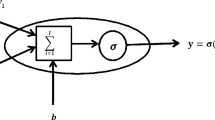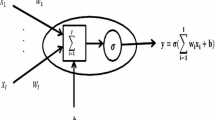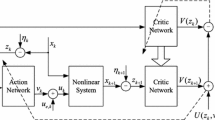Abstract
We present optimal control approach to improve the neural network learned on a given empirical data (set of observations). Artificial neural networks usually are described as black-boxes and it is difficult to say something about their properties than very general results received from learning data. For many applications, e.g. medicine or embedded system for controlling autonomous vehicles, it is essential to say not only that on training data we get some error but that we will make an error not greater than some \(\varepsilon \) for every data we can input to our system. To derive required theory we apply an optimal control theory to a certain family of neutral networks, considered as ordinary differential equations, defined by a set of controls and suitable constructed functional.
Very often we have additional information or knowledge on the problem the data represent. Our approach allows to include these information and knowledge in the construction of the model.
We apply a modification of classical dynamic programming ideas to formulate a new optimization problem. We use it to state and prove sufficient approximate optimality conditions for finding approximate neural network which should work correctly for given \(\varepsilon \) with respect to built functional, on a data different than the set of observations.
Access this chapter
Tax calculation will be finalised at checkout
Purchases are for personal use only
Similar content being viewed by others
References
Bazaraa, M.S., Sherali, H.D.: Nonlinear Programming: Theory and Algorithms. Wiley, Hoboken (2013)
Bhosekar, A., Ierapetritou, M.: Advances in surrogate based modeling, feasibility analysis and optimization: a review. Comput. Chem. Eng. 108, 250–267 (2018)
Caballero, J.A., Grossmann, I.E.: An algorithm for the use of surrogate models in modular flowsheet optimization. AIChE J. 54(10), 2633–2650 (2008)
Cozad, A., Sahinidis, N.V., Miller, D.C.: Learning surrogate models for simulation-based optimization. AIChE J. 60(6), 2211–2227 (2017)
Deng, L., Yu, D.: Deep learning: methods and applications. Technical Report MSR-TR-2014-21, May 2014. https://www.microsoft.com/en-us/research/publication/deep-learning-methods-and-applications/
Ieracitano, C., Mammone, N., Hussain, A., Morabito, F.C.: A novel multi-modal machine learning based approach for automatic classification of EEG recordings in dementia. Neural Netw. 123, 176–190 (2020)
Kaiming, H., Xiangyu, Z., Shaoqing, R., Jian, S.: Deep residual learning for image recognition. arXiv preprint arXiv:1512.03385v1 (2015)
Kuhn, H.W., Tucker, A.W.: Nonlinear Programming. Traces and Emergence of Nonlinear Programming, pp. 247–258 (2014)
Liu, D., Wu, Y.L., Li, X., Qi, L.: Medi-care AI: predicting medications from billing codes via robust recurrent neural networks. Neural Netw. 124, 109–116 (2020)
Nowakowski, A.: \(\varepsilon \)-value function and dynamic programming. J. Optim. Theory Appl. 138, 85–93 (2008). https://doi.org/10.1007/s10957-008-9367-5
Qianxiao, L., Shuji, H.: An optimal control approach to deep learning and applications to discrete-weight neural networks. In: Proceedings of the 35th International Conference on Machine Learning. arXiv preprint arXiv:1803.01299v2 (2018)
Perko, L.: Differential Equation and Dynamical Systems. Springer, New York (1991). https://doi.org/10.1007/978-1-4684-0392-3
Shokry, A., Ardakani, M.H., Escudero, G., Graells, M., Espuna, A.: Dynamic kriging-based fault detection and diagnosis approach for nonlinear noisy dynamic processes. Comput. Chem. Eng. 106, 758–776 (2017)
Author information
Authors and Affiliations
Corresponding author
Editor information
Editors and Affiliations
Rights and permissions
Copyright information
© 2022 The Author(s), under exclusive license to Springer Nature Switzerland AG
About this paper
Cite this paper
Lipnicka, M., Nowakowski, A. (2022). Optimal Control in Learning Neural Network. In: Le Thi, H.A., Pham Dinh, T., Le, H.M. (eds) Modelling, Computation and Optimization in Information Systems and Management Sciences. MCO 2021. Lecture Notes in Networks and Systems, vol 363. Springer, Cham. https://doi.org/10.1007/978-3-030-92666-3_26
Download citation
DOI: https://doi.org/10.1007/978-3-030-92666-3_26
Published:
Publisher Name: Springer, Cham
Print ISBN: 978-3-030-92665-6
Online ISBN: 978-3-030-92666-3
eBook Packages: Intelligent Technologies and RoboticsIntelligent Technologies and Robotics (R0)




